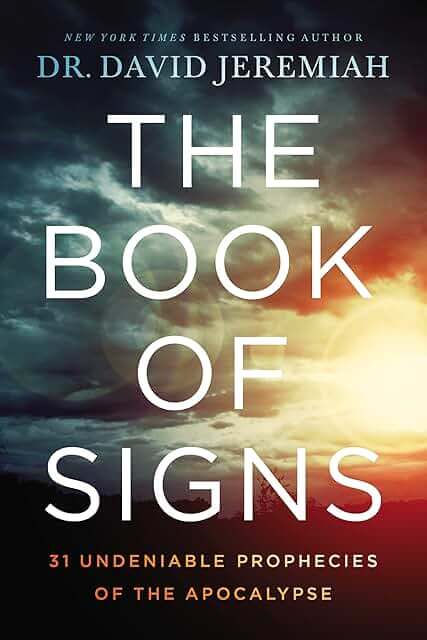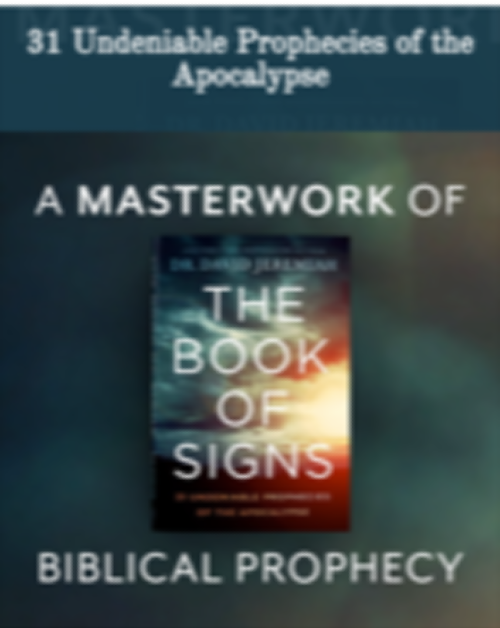| site search by freefind |
- Home
- Bible Prophecy
- Book of Signs
[If you purchase anything on this site, I may make a commission. Disclosure Policy]
The Book Of Signs
31 Undeniable Prophecies of the Apocalypse
The Book Of Signs - 31 Undeniable Prophecies of the Apocalypse by Dr. David Jeremiah has been popping up on my Facebook page frequently. Usually, I would ignore what I see as the sensationalizing of Scripture. It is, unfortunately, common. However, the bold claim to have ‘undeniable prophecies’ caught my attention. I understand that this is probably a marketing ploy that will ‘undoubtedly’ be successful, but it is a claim that should be examined.
What True Christians Believe
All true Christians believe that Jesus will return. They agree that this return will be visible, physical and at the end of the world as we know it. At the time of the return of Jesus, there will be a judgment. Those who have accepted Jesus as Lord and Saviour may be rewarded but will definitely enter eternity in the glorious presence of God. Those who have not accepted Jesus as Lord and Saviour will be sentenced to some degree of eternal punishment. At death, a person is locked into one destiny or the other forever, depending on their relationship with Jesus Christ. The Book Of Signs - 31 Undeniable Prophecies of the Apocalypse by Dr. David Jeremiah agrees with this, but its "prophecies" deal more with speculation on how this will happen.
Sitemap -
Newsletter -
Statement Of Faith -
Donate
Follow us on social media for daily Scripture comments and more at MeWe, Facebook or YouTube.
The how and when of the return of Jesus has been controversial from the beginning of church history. Sincere, Jesus-loving, Bible-believing Christians have often disagreed on these details. While I feel strongly about my position and expect others to feel just as strongly about their position - and I believe we should all be willing to change if convinced from Scripture of error - I think the claim that The Book Of Signs has 31 Undeniable Prophecies of the Apocalypse where genuine Christians have failed to come to a conclusive agreement in about 2,000 years is extreme. This self-proclaimed "masterpiece" of Bible prophecy should be examined in the light of Scripture in context.
Historical Views On The Coming Of Christ
Let’s take a quick look at the three main views Christians have held over the last 2,000 years on the return of Jesus. This is just a broad stroke, and, of course, each view has multiple variations. Interestingly, the views are all defined by their interpretation of the millennium, which is only explicitly mentioned in one section of Scripture: Revelation 20.
Historical Premillennialism
The Historical Premillennialism view believes that Jesus will return before [pre-] the millennium begins. They looked for a literal reign of Jesus on the earth for 1,000 years. It is generally believed that the Tribulation is at the end of this period. Historical Premillennialism also sees the church and Israel united in New Testament times and believes that the church and the Age of Grace were featured in Old Testament prophecies.
Amillennialism
The Amillennial view believes that there is no [a-] literal millennium but that the millennium is the spiritual reign of Jesus in the hearts of believers during the Church Age. In other words, they equate the Kingdom of God established at the resurrection of Jesus with the millennium. They believe that Jesus returns at the end of this period to reign in the New Heavens and New Earth. They do believe that things will grow darker before the return of Christ. They also see the Old Covenant blessings as being fulfilled in the Church.
Postmillennialism
The Postmillennial view believes that Jesus will return after [post-] the millennium. They believe the millennium is a long period of time [symbolically represented by 1,000 years] after which Jesus will return. Postmillennialists are the “end-times” optimists. They do not necessarily believe that the entire world will be Christian before the return of Christ, but they definitely believe that the majority of the world will be under the positive influence of Christianity as the tiny original seed grows to be a great tree. They tend to believe that the Church was the goal and Israel was the method, with both believing Jews and believing Gentiles being united with Christ forever.
The New Boy On The Block:
Dispensationalism
The Dispensational view is premillennial, although, in other respects, it differs significantly from Historical Premillennialism. Dispensationalists view the millennium as a literal 1,000-year period during which Christ will reign on earth. They also believe that things will get worse before the return of Christ. They are focused on Israel as the people of God, and the Church is only an interim measure. Their system breaks the Bible into different ‘dispensations’ in which God dealt differently with people in the different dispensations. Therefore, it denies the unity of Scripture.
Dispensationalism, which is very popular in many Christian circles today, has only existed since the 1800s. Its newness does not mean it is wrong, but it does mean it should be scrutinized. John Darby developed this theory. One of the significant influences he had was a book written in the 1500s by Francisco Ribera. Francisco Ribera was a Catholic Jesuit priest who wrote his book to defend the Pope against the charges of the Reformers that the Pope was the Antichrist. In defending the Pope, Ribera put the prophecies of Revelation, Matthew and other sections of Scripture into the future. How ironic is it that one of the most popular Protestant end-times theories today originated from a Catholic priest defending the Pope against the Protestant Reformers!
The Book Of Signs -
31 Undeniable Prophecies of the Apocalypse
While I do not recommend this book, if you want to confirm that I am quoting it accurately, you can purchase it here. [If you do so, I will make a commission.] Amazon Canada [If you are not in Canada, search on your local Amazon.]

Dispensationalism is the perspective Dr. David Jeremiah took in his book. The Book Of Signs and many of its 31 Undeniable Prophesies of the Apocalypse have been denied by all three long-term end-times views. That should have eliminated the word "undeniable" from the subtitle.
I want to clarify that I have nothing against Dr. David Jeremiah. I do not doubt that he is a sincere Christian who loves the Lord and believes in the authority of God’s Word. Like Tim Lahaye and others, I am sure he has excellent material on other subjects. However, since these prophecies have been put forward as ‘undeniable,’ let’s examine them and see if they are indeed undeniable.
Introduction
The Book Of Signs
“…people have always been fascinated with the future. In the uncertain and often anxious times in which we live, all of us yearn to see ahead, to know, and perhaps to avert disaster…prophetic events foretold by God’s prophets, written out in Scripture, and confirmed in the headlines of the day.” Jeremiah, David. The Book of Signs (pp. x-xi). Thomas Nelson. Kindle Edition.
IF God has indeed given us signs in Scripture that are being played out in today’s headlines, then we should study and know them. God never does anything to satisfy idle curiosity or sensationalize His Word. If what we are about to look into is the correct interpretation, then so be it. I will have to change.
However, IF God has given us these prophecies for a different reason or they have a different meaning, then I am afraid this view is dangerously close to violating God’s command in Lev. 19:31:
Do not turn to mediums or seek out spiritists, for you will be defiled by them. I am the Lord your God.

Why do people turn to mediums? Because they want to know the future apart from God. IF these signs are God-given, then they are legitimate; however, if they are misapplying Scripture, then people are unintentionally or ignorantly degrading the Holy Word of God into a future-predicting manual against God’s commands.
As the signs in this book unfold, it will be revealed that we can expect a period of international and cultural chaos with the possibility of ceaseless, unending, terrible war…there will be more and more disease and devastation….understanding the signs presented in the five parts of this book will help you live with confidence, hope, and a renewed sense of purpose. Jeremiah, David. The Book of Signs (p. xi-xii). Thomas Nelson. Kindle Edition.
I am glad someone will get confidence and hope from this, because I would be scared to death if I believed it. What I find interesting is that the Book of Revelation, at the very beginning, states:
Blessed is the one who reads aloud the words of this prophecy, and blessed are those who hear it and take to heart what is written in it because the time is near. Rev. 1:3, NIV
One thing that we can agree on from the very beginning is that God is “the author of history.” God is sovereign, and He is in perfect control. As Christians, we can rest in that confidence.
These prophecies are supposed to be a blessing. Let’s see if they are…
[I highly recommend you read the articles in the order given, as some later articles refer back to the earlier ones.]

The Book Of Signs
Part One: International Signs
1. Israel
2. Europe
3. Russia
4. Babylon
5. America
Part Two: Cultural Signs
[Since the Cultural Signs all have the same foundation, we will deal with them in one article.]
6. Materialism
7. Immorality
8. Radical Islam
9. Persecution
10. Spiritual Warfare
11. Apathy
Part Three: Heavenly Signs
12. Rapture
[The remaining signs in this section are well done and do not need a lot of comment, so I have included them all in one article. The beginning of the article starts at the Resurrection, but you can click to specific parts of the page with the other chapter titles.]
13. Resurrection
14. Heaven
16. Rewards
17. Worship

Part Four: Tribulation Signs
18. Four Riders
19. AntiChrist
20. False Prophet
21. Martyrs
22. 144,000
23. Two Witnesses
24. Dragon
26. Armageddon
Part Five: End Signs
28. Millennium
29. Great White Throne Judgment
31. Holy City

I would feel very uncomfortable if my interpretation of Scripture had to change every time the headlines changed. A history of Dispensationalism is a history of false predictions and broken promises [Christ will return 40 years after Israel becomes a nation, 88 Reasons Why Christ Will Return In 1988, It’s the Midnight hour, etc.]. Doesn’t the bride of Jesus Christ deserve something better?
To better understand these topics, take our course: Understanding The End Times.
If you are interested in a good commentary on The Book of Revelation, I recommend Days Of Vengeance by David Chilton. [You can get this for free at Gary North Free Books.] Can dispensationalists write books on The Book Of Revelation that non-futurists will appreciate? Surprisingly, the answer is yes. I know of two such books. The reason they are good is that they focus on the theme of Revelation - Jesus Christ - and only occasionally refer to their views on other parts of the book. The two books are The Vision Of His Glory by Anne Graham Lotz and The Revelation Of Jesus by David Binion.
Follow us on social media for daily Scripture comments and more at MeWe, Facebook or YouTube.
Sitemap -
Newsletter -
Statement Of Faith -
Donate
Sign up for our free monthly newsletter or take one of our free Bible Study courses.
Please note: We no longer have the commenting feature [maybe again in the future]. Joshua Institute students who have questions or comments on their courses can use the contact button and mention the course name and lesson number in the email. Thank you. Glenn

Privacy - Disclosure










![The Book Of Signs has two judgments [rewards vs Lake of Fire] separated be seven years. Is this what Scripture teaches?](/image-thumbnails/GreatWhiteThrone.png/default.webp)

